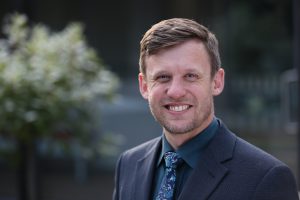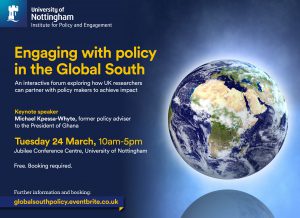
February 24, 2020, by Rob Ounsworth
Join us in March to discuss improving policy engagement with the Global South
Chris Sims, Head of Global Policy Impact at the Institute for Policy and Engagement, outlines an opportunity for researchers to gain insights directly from Global South policy makers.
Countries in the Global South factor prominently in both the research conducted and curricula taught in UK universities, including Nottingham. How this research and teaching deals with complex colonial history and international power imbalances has become the subject of intense critical work, often summarised as the ‘decolonisation’ of research and the curriculum. It’s notable, though, that the ‘decolonisation of impact’ has yet to receive such attention.

Chris Sims: researchers seeking to have international impact must navigate in the context of global imbalances of power
On the face of it, this is rather odd. Academics are increasingly under pressure to achieve ‘impact’, and the most common form of impact quoted in the REF is policy impact – in other words, influencing decisions by governments and other authorities or agencies. For many academics, due to the nature of their research, this means influencing decisions outside the UK, and often in the Global South.
But if policy impact is hard to do in the UK, how much more difficult must it be to achieve when working across cultural differences that necessitate changes in the way you approach partners or conduct research? How is that difficulty compounded when your audience represents the government of a country whose experience of colonisation is in living memory? And more fundamentally, what questions does this raise about the ethics of ‘doing’ impact in a post-colonial context, or one characterised by extreme global imbalances of power?
Influencing policy in international contexts requires skills and insight
I speak partly from experience, having spent two years in Delhi working on skills development policy issues for a UK organisation, and having to learn very quickly to navigate this difficult terrain and remain equitable and respectful of my Indian policy audiences, learning from and being guided by them while also sharing what I hope were valuable and useful insights. I don’t delude myself that I ever perfected this – and I had the advantage of being based in the country for a fairly long period of time.
As the impact agenda gathers pace, this is an important issue for the University to understand and address. If we expect our academics to influence policy in international contexts, we owe it to them to help them develop the necessary skills and insights to do so in a productive and positive way. The impact agenda is, rightly, subject to ongoing criticism that helps us to reflect on its purpose and value and the approach we take to achieving impact; we need to turn this critical lens more sharply on its international aspects. There are also important questions here for funders – in particular, about how the processes of obtaining funding can perpetuate imbalances of power.
The Institute for Policy and Engagement wants to play its part in supporting academics who want to influence policy internationally. Helping them think critically about these issues is essential to that. We also know, however, that we don’t have the answers ourselves, and that these questions can only be tackled effectively by listening to voices from the Global South.
Book now for Engaging with Policy in the Global South
That’s why we’re hosting a one day conference on Engaging with Policy in the Global South, which will take place at the Jubilee Conference Centre on Tuesday 24 March. The event will bring UK academics, from Nottingham and elsewhere, together with policy practitioners from a range of countries in the Global South. Our goal is to build understanding about how to forge relationships that allow for researchers to enter into collaborative engagement with policy makers without reproducing inequalities and injustices. The day will include a range of interactive sessions featuring speakers from the policy world as well as academics who can share insight into these questions from their own experience. We have also built in plenty of time for informal conversation and networking throughout the event.
This will be a unique opportunity to gain insight directly from Global South policy makers. We expect the attendees to come away challenged as to how they approach their impact work, but also with new knowledge and insights that will give them more confidence on how to engage policy audiences and to critically reflect on their own practice.
If you are wanting to engage with policy makers in the Global South, we hope you will join us for what promises to be a valuable and stimulating day – and the beginning of a much longer conversation about how UK-based academics can have a positive impact on the world. For more information about the event, visit our registration site, and please do get in touch at theinstitute@nottingham.ac.uk.
No comments yet, fill out a comment to be the first


Leave a Reply